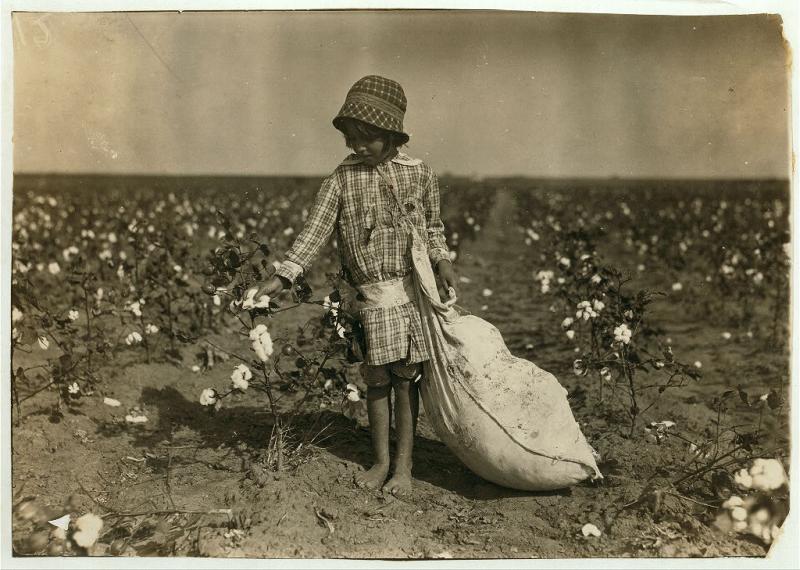A Six Year-Old Girl Picking Cotton
6-year old Jewel Walker picks cotton in Comanche County, Oklahoma. Other pictures taken in Comanche include quotations from parents and children, and detail about their labor. For example, Jewel and her younger brother, Harold (not depicted), pick 20 to 25 pounds of cotton. Their father said "I promised em a little wagon if they'd pick steady, and now they have half a bagful in just a little while."
Lewis W. Hines, Jewel and Harold Walker, 6 and 5 Years Old. October 10 1916. Library of Congress: Prints and Photographs Division. https://www.loc.gov/item/2018678165/
The photographer, Lewis W. Hine is best known for his photos of child labor practices, which were produced with the support of the National Child Labor Committee from 1911-1916. He also photographed immigrants at Ellis Island starting in 1904. Hine also took pictures of the effects of World War I in Farance and the Balkans for Red Cross Magazine.
"Lewis Wickes Hine". International Center of Photography. Accessed November 1 2018. https://www.icp.org/browse/archive/constituents/lewis-wickes-hine?all/al...

Hine, Lewis Wickes. 6-Year Old Jewel Walker. See 4564 and 4565. Location: Comanche County -- [Geronimo], Oklahoma. October 16, 1916. Photograph. Library of Congress: Prints and Photographs Divisions. https://www.loc.gov/item/2018675241/ (Accessed November 1, 2018).
Public Domain
Public Domain is a copyright term that is often used when talking about copyright for creative works. Under U.S. copyright law, individual items that are in the public domain are items that are no longer protected by copyright law. This means that you do not need to request permission to re-use, re-publish or even change a copy of the item. Items enter the public domain under U.S. copyright law for a number of reasons: the original copyright may have expired; the item was created by the U.S. Federal Government or other governmental entity that views the things it creates as in the public domain; the work was never protected by copyright for some other reason related to how it was produced (for example, it was a speech that wasn't written down or recorded); or the work doesn't have enough originality to make it eligible for copyright protection.
Add a comment
PLEASE NOTE: NCpedia provides the comments feature as a way for viewers to engage with the resources. Comments are not published until reviewed by NCpedia editors at the State Library of NC, and the editors reserve the right to not publish any comment submitted that is considered inappropriate for this resource. NCpedia will not publish personal contact information in comments, questions, or responses. If you would like a reply by email, note that some email servers, such as public school accounts, are blocked from accepting messages from outside email servers or domains. If you prefer not to leave an email address, check back at your NCpedia comment for a reply. Please allow one business day for replies from NCpedia. Complete guidelines are available at https://ncpedia.org/about.